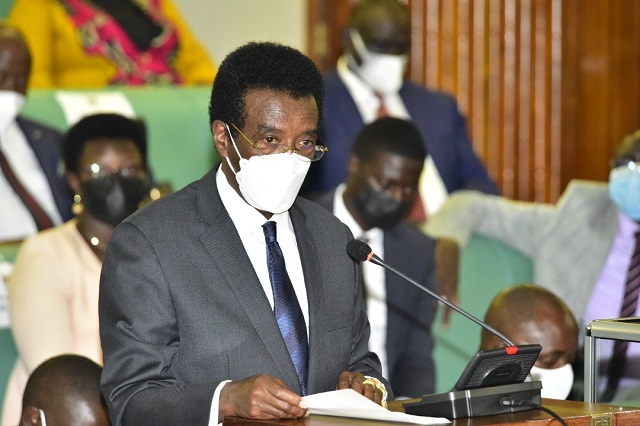
Kampala, Uganda | THE INDEPENDENT | Lawmakers want government to review a plan to charge Ugandans an extra cost on motor vehicle and motorcycle number plates under an agreement with a Russian Company, Joint Stock Company Global Security that was procured to implement the Intelligence Transport Monitoring System (ITMS).
On 23 July 2021, Government entered into an agreement with the Russian firm to implement the ITMS.
According to the agreement, the number plates will be installed during vehicle and motorcycle registration and Ugandans will pay for the number plates at a cost to be determined by the company. It is expected to be higher than the current cost.
MPs who were responding to a statement by Minister of Security, Jim Muhwezi on 29 September 2021 said government should instead meet the cost.
Rakai District Woman MP, Juliet Kinyamatama wondered what would happen to Ugandans who already own cars with old number plates.
“Will these people have to buy new number plates and if it is a small cost as you say, can’t you take it up under your classified expenditure and make sure that Ugandans also benefit in such a way,” she said.
Naome Kibaaju (NRM, Sheema County) said that majority of Ugandans are forced to buy cars with their meagre resources because of the poor public transport system.
“Most cars on the roads are not by choice but because it is a necessity, so to make Ugandans pay more money is not fair. I ask the Minister to review this,” Kibaaju said.
Sarah Opendi (NRM, Tororo District) said that it is government’s responsibility to ensure the citizens are secure and asked the the state to meet the cost of the number plates.
“Importing a car in this country is already expensive because of the taxes. I want to own a V8 like the one you drive, Mr. Speaker and it is cheap to buy it from Japan, but the taxes are too high,” she said.
Milton Muwuma (NRM, Kigulu County South) warned that Uganda might get plunged into the same scenario with Muhlbauer, a company that was procured to issue national Identification cards in 2010, where he said government made losses.
“Government had to come back to Parliament to ask for more resources to ensure the intended purpose of issuing IDs to Ugandans is achieved because the process was flawed,” Muwuma said.
Bukooli Central MP, Solomon Silwany accused government of flouting the procurement process saying that the company was not subjected to a competitive process which would have enabled selection of the best service provider.
“Even if you are doing direct procurement, you cannot get one company, you have to get at least four companies for Ugandans to get value for money. We should have compared because we want Ugandans to get the best benefits from the little money we have,” he said.
Kazo County Representative, Dan Atwijukire said that the method used to acquire the service was wrong.
“When we talk about direct procurement, there should be an emergency; from 2018, this cannot be an emergency. When you google this company, on the basics, it has issues to do with bankruptcy. How do we solve a smaller problem with a bigger problem,” Atwijukire said.
Nathan Byanyima (NRM, Bukanga North) said there is need to have a new start for the country saying that the 11th Parliament is majorly comprised of young MPs who have the potential to cause positive change.
“Are we not tired of doing fake things in this country? This is fake. You cannot continue giving Ugandans supper at lunch time. We have done fake things in the eyes of Ugandans and we shall eventually pay,” he said.
Muhwezi assured the MPs that the cost of the number plates will not be high.
“A technical team of government shall assess the cost of the plates before the actual figure is firmed and implemented,” said Muhwezi.
He also said that the company was contracted under section 33 of the Public Private Partnership (PPP) Act, 2015 which permits the sole sourcing procurement method where circumstances do not allow the use of competitive means.
“Procurement of security equipment is a sensitive and delicate matter which cannot be subjected to open competitive methods. It should also be noted that the company we have engaged is an innovator,” he said.
Joint Stock Company Global Security, which emerged as a potential investor in June 2019 is said to be facing multiple bankruptcy proceedings in Moscow but Muhwezi said that it is not true.
“If it was to be true, there are clauses that protect government and we would not lose anything. If the company is found bankrupt, government will terminate the agreement with no losses incurred,” Muhwezi said.
Government procured the company to implement the smart tracking project for a period of 10 years. It involves mounting tracking GPS chips in all automobiles in the country at the owner’s expense. It will also require re-registration of all vehicles, motorcycles, and boats.
*****
SOURCE: UGANDA PARLIAMENT MEDIA
 The Independent Uganda: You get the Truth we Pay the Price
The Independent Uganda: You get the Truth we Pay the Price



